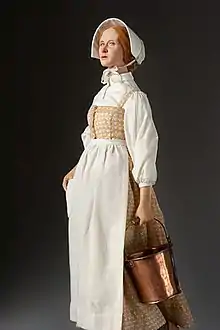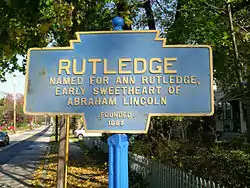Ann Rutledge
Ann Rutledge (January 7, 1813 – August 25, 1835) was allegedly Abraham Lincoln's first love.
Ann Rutledge | |
|---|---|
 A likeness by artist and historian George S. Stuart created from her physical description mentioned in historical records.
No known painting of Ann Rutledge exists from life. | |
| Born | January 7, 1813 |
| Died | August 25, 1835 (aged 22) |
| Burial place | Old Concord Burial Ground, Petersburg, Illinois (1835–1890) Oakland Cemetery, Petersburg, Illinois (1890–present) |
| Known for | Alleged romantic relationship with Abraham Lincoln |
| Partner(s) | John MacNamar (e. ?–1835) |

Early life
Born near Henderson, Kentucky, Ann Mayes Rutledge was the third of 10 children born to Mary Ann Miller Rutledge and James Rutledge. In 1829, her father, along with John M. Cameron, founded New Salem, Illinois.
Alleged romantic relationship with Lincoln
Many of the facts of her life are lost to history, but some historians believe that she was the first love of Abraham Lincoln. The exact nature of the Lincoln–Rutledge relationship has been debated by historians and non-historians since 1865.
The story goes that Rutledge was engaged to marry John MacNamar, a dubious character who left for New York and promised to marry her upon his return. Rutledge and Lincoln met after this and supposedly fell in love while MacNamar was away and she promised to marry Lincoln after MacNamar released her. For a time Rutledge and MacNamar exchanged letters, but his letters became more formal and "less ardent in turn" and eventually ceased completely.[1] MacNamar never returned before her death.[2]
Death and burial
In 1835, a wave of typhoid hit the town of New Salem. Ann Rutledge died at the age of 22 on August 25, 1835. This sad event left Lincoln severely depressed.[3] Historian John Y. Simon reviewed the historiography of the subject and concluded, "Available evidence overwhelmingly indicates that Lincoln so loved Ann that her death plunged him into severe depression."[2] An anonymous poem about suicide, The Suicide's Soliloquy, published locally exactly three years after her death, is widely attributed to Lincoln.[4]
Many years later, after Lincoln's first election as President, Isaac Cogdal, Lincoln's old friend, ventured to ask whether it was true that Lincoln had fallen in love with Ann. Lincoln replied:
It is true—true indeed I did. I loved the woman dearly and soundly: She was a handsome girl—would have made a good, loving wife… I did honestly and truly love the girl and think often, often of her now.[3]
Ann Mayes Rutledge was laid to rest in the Old Concord Burial Ground; however, the body was exhumed and then buried in the Oakland Cemetery in Petersburg, Illinois, when an undertaker became financially interested in the cemetery in 1890.[5] At this time the cheap stone marker was replaced with a granite monument that included the lyrics of Edgar Lee Masters and reads:[6][7]
Out of me unworthy and unknown
The vibrations of deathless music:
"With malice toward none, with charity toward all."
Out of me the forgiveness of millions toward millions,
And the beneficent face of a nation
Shining with justice and truth.
I am Ann Rutledge who sleeps beneath these weeds,
Beloved in life of Abraham Lincoln,
Wedded to him, not through union,
But through separation.
Bloom forever, O Republic,
From the dust of my bosom!
As biographer, Masters reported "very little to be found to justify" the story of Ann Rutledge, and that Lincoln was never "deeply attached" to any woman.[8]
Post-mortem allegations of Lincoln relationship
William Herndon's account
After Lincoln's assassination in 1865, his friend and law partner William Herndon first revealed the story of the supposed romance between Rutledge and Lincoln, much to Mary Todd Lincoln's anger and dismay. However, Herndon despised Mary Todd Lincoln and may have fabricated or enhanced the story of a romance between Ann Rutledge and Abraham Lincoln to serve as a "thorn in the side" of Mary Todd Lincoln. Abraham Lincoln's surviving son Robert Todd Lincoln was also upset by Herndon's claim. However, another belief is that Herndon may have fabricated it to hide Lincoln’s sexuality from the public. Most of Herndon's sources came from interviews with Lincoln's early friends in New Salem and Ann's relatives. The story was later repeated by Herndon in several lectures and books.
Historical criticism of alleged Lincoln-Rutledge relationship
Several historians have claimed that the evidence of a love affair between Lincoln and Rutledge is tenuous at best. In his Lincoln the President, historian James G. Randall wrote a chapter entitled "Sifting the Ann Rutledge Evidence" which cast doubt on the nature of her and Lincoln's relationship.
Lewis Gannett, writing in the Journal of the Abraham Lincoln Association, claims that "Nearly sixty years after James G. Randall delivered a seeming coup de grâce to the Ann Rutledge legend, the legend may be nearing a second death."[9] However, since William Herndon was not the only witness to the Lincoln-Rutledge relationship,[10] efforts to minimize her role in Lincoln's early life have so far failed.
In popular culture
The 1930 D. W. Griffith film Abraham Lincoln features Rutledge as a main character; in the film, Una Merkel plays Rutledge.
Actress Pauline Moore plays Ann Rutledge in John Ford's 1939 film Young Mr. Lincoln. Following Ann's death, Lincoln (Henry Fonda) visits her graveside and makes the fateful decision to leave home and pursue a law practice in Springfield.
Actress Mary Howard played Ann Rutledge in John Cromwell's 1940 film Abe Lincoln in Illinois. The film was adaptation of a play where Rutledge was played on Broadway by Adele Longmire. It was revived on Broadway in 1993–94 with Rutledge portrayed by Marissa Chibas.
The Lincoln-Rutledge relationship plays an important part in the growth of Lincoln in Seth Grahame-Smith's novel Abraham Lincoln, Vampire Hunter. In it, MacNamar is a vampire. When he learns that Rutledge has fallen in love with Lincoln, he returns to New Salem and kills her by infecting her. The symptoms of her infection resemble those of typhoid fever.
An earlier, more traditional novel on the subject is Bernie Babcock's The Soul of Ann Rutledge, Abraham Lincoln's Romance, published in 1919.
In the 2016 TV movie series Signed, Sealed and Delivered, in episode 6 "From the Heart," the Postables find a valentine from Ann to Abe telling him goodbye and makes mention of Abe visiting her while she was ill.
References
- Herndon pg. 110
- John Y. Simon (1990). "Abraham Lincoln and Ann Rutledge". Journal of the Abraham Lincoln Association. Michigan Publishing. Archived from the original on 2012-06-12. Retrieved February 12, 2009.
- Donald pp. 57–58
- Joshua Wolf Shenk (June 14, 2004). "The Suicide Poem". The New Yorker. Retrieved June 1, 2009.
- Erickson, Gary (Fall 1969). "The Graves of Ann Rutledge and the Old Concord Burial Ground". Lincoln Herald. 71 (3): 90–107.
- Tombstone inscription, Ann Mayes Rutledge Gravestone, Oakland Cemetery, Petersburg, IL
- "New Monument over Grave of Ann Rutledge, Lincoln's Early Sweetheart". Journal of the Illinois State Historical Society. 13: 567–568. January 1921.
- Masters, Edgar Lee (1931). Lincoln the Man. New York: Dodd, Mead. pp. 45, 76.
- Gannett, Lewis (Winter 2005). ""Overwhelming Evidence" of a Lincoln-Ann Rutledge Romance?: Reexamining Rutledge Family Reminiscences". Journal of the Abraham Lincoln Association. 26 (1): 28–41.
- "The Women: Anne Rutledge (1813-1835)". Mr. Lincoln & Friends.